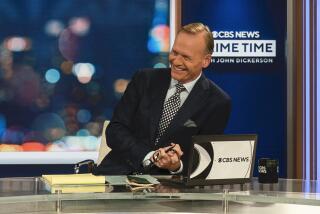GENERAL VS. CBS: IS THERE A WINNER?
Huh?
The program was Cable News Network’s “Freeman Reports.” The time was Monday evening, about six hours after CBS and Gen. William C. Westmoreland had formally announced the surprising withdrawal of his $120-million libel suit against the network, a case that would soon have gone to the jury after 18 tortuous weeks in court.
Westmoreland, who was commander of U. S. forces in Vietnam, had charged that a 1982 “CBS Reports” documentary, “The Uncounted Enemy: A Vietnam Deception,” falsely accused him of conspiring to underestimate enemy troop strength in 1967 to paint a rosier picture of the Vietnam War.
And now, after months of facing each other in a Manhattan courtroom, CBS attorney David M. Boies and Westmoreland attorney Dan M. Burt were side by side on national TV, two wild and crazy guys, laughing and joshing like two fraternity pledges who had come through initiation.
Burt seemed preoccupied with clothes. He made a joke about Van Gordon Sauter, the bearded, bow-tied executive vice president of the CBS Broadcast Group, who was also on the program. Sauter didn’t dress too shabbily “for a CBS executive,” that great card Burt remarked.
Ha. Ha. Ha. Ha.
The aftermath of CBS/Westmoreland is getting to sound more and more like: “Who’s on first?” It’s too early to assess the case’s impact on the conduct of journalism and libel suits brought by public figures. For now, there is a more immediate question to be answered.
Who won?
No wonder Burt was smiling. Westmoreland won the case. No wonder Boies was smiling. CBS won the case too. That was the indication given by each side in moving from interviewer to interviewer Monday and Tuesday like players in a game of musical news programs.
Burt and Westmoreland insisted that Westmoreland won on the basis of a public statement released by both sides Monday saying the network did not think the general “unpatriotic or disloyal in performing his duties as he saw them” in Vietnam.
The CBS program had never made Westmoreland’s patriotism or loyalty an issue though.
In a testier appearance with Burt on public TV’s “MacNeil/Lehrer NewsHour,” CBS lawyer Boies said: “I think it is in everybody’s interest to allow Gen. Westmoreland . . . to retire with as much dignity as possible.” He added, though: “I think it would be a mistake to interpret a paragraph of graciousness as anything like an apology.”
True. CBS did seem to be acting magnanimously. The majority opinion seemed to be that Westmoreland quit the case when it appeared he was a sure loser. He seemed to have underestimated enemy strength.
This time the enemy was CBS.
“To say that you were not disloyal as you saw it is not to say anything at all,” Ted Koppel bluntly told Westmoreland on ABC’s “Nightline” Monday. Koppel was referring to Westmoreland’s joint statement with CBS.
“You didn’t get an apology,” Koppel said.
“I got what I considered an apology,” Westmoreland replied.
Earlier on “Freeman Reports,” Westmoreland had told legal correspondent Steve Nevas: “I believe if I had to do it (file suit) over again, I would.” He would have undertaken a case that ended embarrassingly for him? Westmoreland sounded sincere.
If there was one thing that was clear about the outcome it was that nothing was clear.
Instead of a jury decision, there was a blur, an aura of unreality and confusion (the CBS documentary accused Westmoreland of “overestimating” the enemy, Joan Lunden misspoke Monday on ABC’s “Good Morning America”).
In numerous TV appearances Monday and Tuesday, Sauter compared Westmoreland’s declaration of victory in the libel case to the late Sen. George Aiken’s 1966 assertion that “the way to get out of Vietnam is to declare victory and leave.”
Mike Wallace (a co-defendant in the suit along with producer George Crile and former CIA analyst Samuel A. Adams) also evoked the Aiken analogy in an interview, as did CBS correspondent Bernard Goldberg in reporting the story on the evening news. A united front, it seemed.
They also might have compared Westmoreland’s declaration of triumph to Time magazine’s specious declaration of victory in a recent major libel suit against it by former Israeli Defense Minister Ariel Sharon. The jury in that case ruled that a portion of an article in Time had indeed defamed Sharon, but that he was not entitled to damages because there was no malice on the part of the magazine. Some Time victory.
Meanwhile, the CBS/Westmoreland blur grew blurrier.
On NBC’s “Today” Tuesday morning, Westmoreland told Bryant Gumbel that CBS was being “ambiguous” and “contradictory.”
Then on CNN that morning, correspondent Charles Feldman told Westmoreland he found the general’s avowed satisfaction with the outcome “a little hard to believe.”
Whereupon, Westmoreland turned philosophical, saying that a “court of law is no place to sort out something as complicated as this.” He made it sound as if CBS had filed the suit. He went on to say that a jury “which has no military experience, no first-hand experience in Vietnam or knowledge of the intelligence system could not make judgments on something this complicated.”
Feldman: What you seem to be saying is that the jury . . .
Westmoreland: No, I think it was a good jury.
Except that it was incompetent to judge this case?
In conclusion, two things can be safely said. Legal history was made in a case won by both the plaintiff and defendant. And Van Gordon Sauter is a swell dresser--for a CBS executive.
Court is adjourned.
More to Read
The biggest entertainment stories
Get our big stories about Hollywood, film, television, music, arts, culture and more right in your inbox as soon as they publish.
You may occasionally receive promotional content from the Los Angeles Times.









